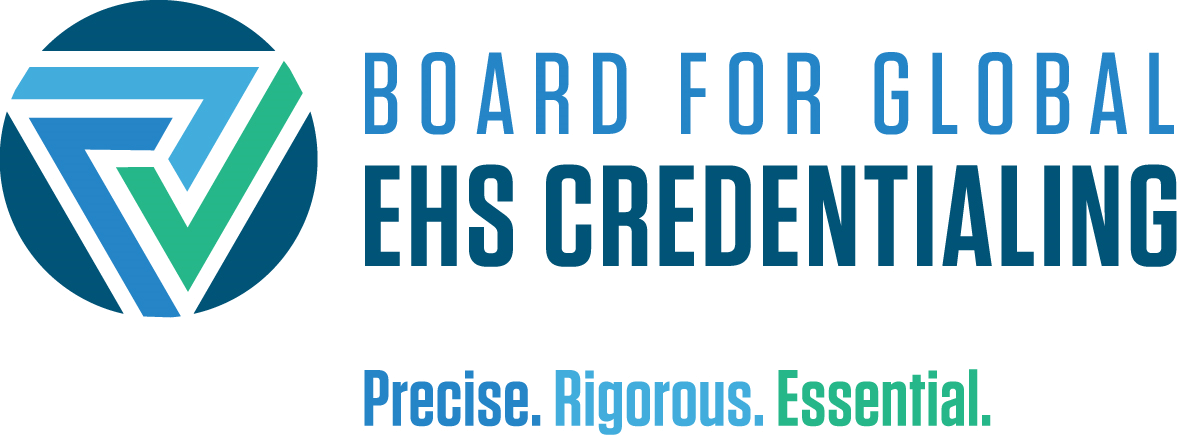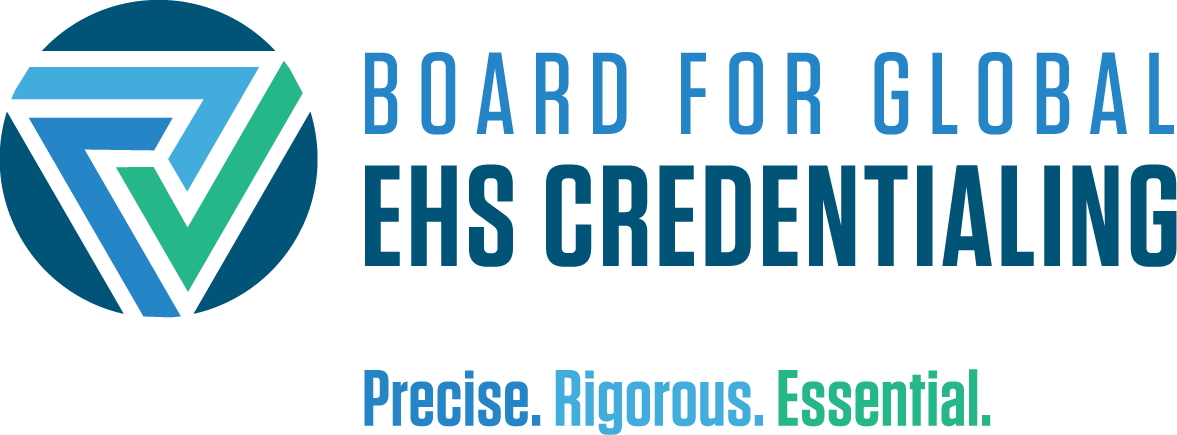|
1914
|
- Industrial Hygiene Section of the American Public Health Association established
|
|
1937
|
- Michigan Industrial Hygiene Association founded
|
|
1938
|
- American Conference of Governmental Industrial Hygienists (ACGIH) founded
|
|
1939
|
- American Industrial Hygiene Association (AIHA) founded
|
|
1956
|
- AIHA appointed an Ad Hoc Committee on Certification
|
|
1957
|
- Committee on Certification Standards appointed
|
|
1958
|
- ACGIH invited to join and begin participating in the discussion on Certification
|
|
1959
|
- Committee recommended a separate Board be established for certification of industrial hygienists
|
|
1960
|
- Twelve delegates held first meeting in Rochester, New York
- Petition for Incorporation approved by Court of Common Pleas of Allegheny County
- First Board meeting held in Pittsburgh, Pennsylvania
|
|
1962
|
- First application period expires – 485 industrial hygienists qualified under 15-year experience criteria
|
|
1963
|
- First examinations held in Cincinnati, Ohio. Bachelor’s degree and 8 years’ experience required as a minimum
- Examination consisted of Core and Comprehensive Practice or 1 of 6 aspect exams (acoustical, air pollution, chemical, engineering, radiological, and toxicological)
- First certificates issued for Comprehensive Practice, Chemical Aspects, and Engineering Aspects by written examination
|
|
1964
|
- First certificates issued for Air Pollution, Radiological Aspects, and Toxicological Aspects by written examination
|
|
1969/1970
|
- Toxicological Aspects examination withdrawn, pending update
|
|
1971
|
- Last certificate issued for Radiological Aspects by written examination
|
|
1972
|
- Eligibility requirements for CIH examination changed from 8 to 5 years of experience/equivalency, beginning with 1973 examinations
- Core- and second-level examination eligibilities: Core eligibility set to 1-year experience/equivalency with 1973 examinations. Core-only examination to be for Industrial Hygienist in Training, IHIT
|
|
1973
|
- Decision to restore eligibility provisions for applicants without bachelor’s degrees
- First Certificate for Acoustical Aspects written examination
|
|
1976
|
- Industrial Hygiene Technologist certification program established
|
|
1977/1978
|
- Decision to accept credentials from the Institute for Noise Control Engineering (INCE) and from the American Board of Health Physics (ABHP) in lieu of second-level examinations in the Acoustical and Radiological Aspects respectively
|
|
1979
|
- Certification Maintenance program initiated; 6-year recertification cycle
- First ABIH Executive Director hired (part-time)
- Reintroduction of written examination in the Toxicological Aspects
|
|
1984/1985
|
- First formal Role Delineation/Task Analysis (RD/TA) study
|
|
1986
|
- Joint Committee established with Board of Certified Safety Professionals (BCSP) for technician level certifications
- Decision to grant 1-year experience equivalency for applicants with an Industrial Hygiene Master’s degree and 2 years for an Industrial Hygiene doctoral degree, beginning in 1987
|
|
1988
|
- Last Toxicology Aspect examination given
- Decision to discontinue eligibility provisions for non-degree applicants after 1990
|
|
1990
|
- Decision to discontinue certifications in the Acoustical, Air Pollution, Engineering, and Radiological Aspects at the end of 1991
|
|
1991
|
- Decision to offer subspecialty examinations in Indoor Environmental Quality (IEQ) and Hazardous Material Response and Remediation (HMRR)
|
|
1992
|
- Aspect exams (except Chemistry) eliminated
|
|
1993
|
- Subspecialty examinations first offered – IEQ and HMRR
|
|
1994
|
- HMRR subspecialty discontinued
|
|
1997
|
- Effective date to limit the 1-year experience equivalency towards a CIH for applicants with a master’s degree from an ABET-accredited Industrial Hygiene program
|
|
1998
|
- Certification Maintenance (CM) Program changed from 6 to 5-year recertification period
|
|
1999
|
- CESB Accreditation obtained for the CIH
- Public member first elected to the Board
- Board votes to establish a permanent Associate-level credential, CAIH, beginning with 2001 examinations
|
|
2000
|
- Decision to discontinue the Core and Chemical Practice examinations and to suspend the IEQ subspecialty exam effective 2001
|
|
2001
|
- Decision to grant 6-months experience equivalency towards a CIH for applicants with a bachelor’s degree from an ABET-accredited Industrial Hygiene program
|
|
2002
|
- Initiated Phase of Industrial Hygiene Coursework requirement for new applications
|
|
2003
|
- IOHA recognition as Certification Board obtained
|
|
2004
|
- Computer-Based Testing (CBT) examinations are given in North America
|
|
2006
|
- Decision to drop the experience requirement relating to a percentage of time practicing Industrial Hygiene
- Decision to allow creditable experience prior to completion of a bachelor’s degree
- Decision to change the experience requirement from 5 to 4 years
- Decision to discontinue offering the CAIH certification
|
|
2007
|
|
|
2008
|
- CBT examinations are given internationally
- Decision to sell interest in CCHEST (ABIH/BCSP joint venture) to BCSP
|
|
2009
|
- ANSI ISO/IEC 17024:2003 Accreditation obtained
|
|
2013
|
- NCCA Accreditation obtained for the CIH
- CESB Accreditation dropped for the CIH
|
|
2014
|
- ABIH announces the retirement of the Executive Director, Lynn O’Donnell, CIH
- ABIH hires a new Chief Executive Officer, Ulric Chung, MCS, PhD
- ABIH representatives participate in the 7th China International Forum on Work Safety in Beijing and participate in meetings with university educators and the Vice Minister of Labor
- ABIH Staff participate in AIHA®/MIHA Asia Pacific Conference in Kuala Lumpur
- BGC Mission is revised to include public protection as essential to the role of a credentialing body: “As the premier credentialing organization for Industrial Hygiene (Occupational and Environmental Health and Safety), the American Board of Industrial Hygiene® (ABIH®) serves its credentialed practitioners by establishing and administering a valid, reliable, and rigorous credentialing process to protect the public and meet the needs of employers”
- Vision statement is revised: “ABIH®-credentialed practitioners will be globally recognized as the epitome of professional competence and ethics in Industrial Hygiene (Occupational and Environmental Health and Safety)”
|
|
2015
|
- Jas Singh is named the 2015 ABIH Lynn C. O’Donnell Lifetime Achievement Award recipient
- Roy Rando is named the 2015 ABIH Impact Award recipient
|
|
2016
|
- ABIH and IPEP Board members sign a memorandum of understanding to initiate a long-term collaboration between organizations
- ABIH Representatives participate in Central Industrial Hygiene Association (CIHA) in India
- John Henshaw is named the 2016 ABIH Lynn C. O’Donnell Lifetime Achievement Award recipient
- Carter Ficklen is named the 2016 ABIH Impact Award recipient
- Board passes resolution to adopt the QEP credentialing program into ABIH
|
|
2017
|
- ABIH, AIHA, and ACGIH sign memorandum of understanding for continued collaboration
- ABIH Representative participates in Central Industrial Hygiene Association (CIHA) in India
- Donna Doganiero is named the 2017 ABIH Lynn C. O’Donnell Lifetime Achievement Award recipient
- Nicole Greeson is named the 2017 ABIH Impact Award recipient
- ABIH office moves to 6005 W. St. Joe Hwy in Lansing
|
|
2018
|
- Mission is updated to “The American Board of Industrial Hygiene® is the premier credentialing organization for professions based on the science of protecting and enhancing the health, safety, and environment of people at work and in their communities. It serves its credentialed practitioners by establishing and administering a valid, reliable, and rigorous credentialing process to protect the public and meet the needs of employers”Vision is updated to “ABIH®-credentialed practitioners are globally recognized as the epitome of professional competence and ethics in professions based on the science of protecting and enhancing the health, safety, and environment of people at work and in their communities”
- ABIH announces the development of a retirement designation for diplomates
- ABIH announces plans to develop a Product Stewardship credential
- The Computer-Assisted Portfolio System (CAPS), a Web-based system for applications and certification maintenance, goes live
- Certification Maintenance processes are updated
- John Mulhausen is named the 2018 ABIH Lynn C. O’Donnell Lifetime Achievement Award recipient
- G. Scott Dotson is named the 2018 ABIH Impact Award recipient
|
|
2019
|
- The Board member terms are aligned to the calendar year
- Susan Ripple is named the 2019 ABIH Lynn C. O’Donnell Lifetime Achievement Award recipient
- Board publicly announces its name change from the American Board of Industrial Hygiene (ABIH) to the Board for Global EHS Credentialing (BGC). ABIH and IPEP names are retained as credentialing divisions under BGC
- September 24, 2019, IPEP dissolves as a legal entity. Examination and trademarks are transferred to the BGC
- BGC and the Product Stewardship Society announce the rollout of the new Certified Professional Product Steward (CPPS) credential
|
|
2020
|
- Internal definition of “EHS” is adopted by the Board: “Environment, Health, and Safety (EHS) is the science and practice of evaluating, protecting, managing, and enhancing the health and safety of people of and the environment”
- Mission is updated using the EHS definition: “To be the leader in offering EHS credentials that elevate the technical and ethical standards for professionals who practice the science of evaluating, protecting, managing, and enhancing the health and safety of people and the environment”
- Vision is updated using the EHS definition: “The Board for Global EHS Credentialing is recognized worldwide for establishing and administering credentials that set the standards of proficiency and ethics for EHS professionals”
- BGC and The Institute of Internal Auditors (IIA) announce the transfer of the Board of Environmental, Health & Safety Auditor Certifications’ (BEAC®) Certified Professional Environmental Auditor® (CPEA®) and Certified Process Safety Auditor® (CPSA®) certifications from The IIA to BGC
- BGC launches a Digital Badging Program
- Roy Rando is named the 2020 ABIH Lynn C. O’Donnell Lifetime Achievement Award recipient
- John Moore II is named the 2020 ABIH Impact Award recipient
- Andrew Broadbent is named the 2020 James C. Ball Lifetime Achievement Award recipient
- BGC celebrates its 60th anniversary
- BGC Forum and Awards Ceremony are held virtually for the first time
- Retired Annual and Retired Lifetime designations announced as alternatives to voluntary surrender
- BGC launches its new online store containing BGC-credentialed customized products
|
| 2021 |
- BGC announces the new QEP Award
- Chris Lacsz-Davis is named the 2021 ABIH Lynn C. O’Donnell Lifetime Achievement Award recipient
- Linda Martin is named the 2021 ABIH Impact Award recipient
- Georgi Popov is named the 2021 QEP Award recipient
- Julie Thompson is named the James C. Ball Lifetime Achievement Award recipient
- The CPPS exam is made available through remote proctoring
- The CIH Certification Exam begins a new JTA process to update the CIH exam for April 2022
- BGC introduces new website Blog
- The first CPEA and CPSA Diplomates through BGC are announced
- BGC holds its second virtual BGC Forum and Awards Ceremony
- BGC adopts a new Mission Statement: “We protect people and the environment worldwide by providing precise and rigorous credentials for essential environmental, health, and safety professionals”
- BGC adopts a new Vision Statement: “A healthy and thriving world made better by BGC credentialed professionals”
|
| 2022 |
- NCCA Accreditation dropped for the CIH
- Ulric Chung, MCS, PhD, steps down as CEO
- Jamie L. White is named the James C. Ball Lifetime Achievement Award Recipient
- Maharshi Mehta is named the Lynn C. O’Donnell Industrial Hygiene Lifetime Achievement Award Recipient
- Sean Gibbs is named the IH Impact Award recipient
- BGC announces the ability for Diplomates to download their certificates via the badging program at Credly
|







